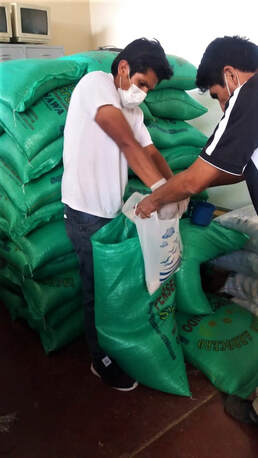| It’s 3:30am, Miriam and her husband Americo are hurrying down the mountain on deserted side-streets hoping to reach the church without any trouble from the military. As the president of the southern churches in Cochabamba, Miriam wants to be there when the order of powdered milk and lentils arrives so that she can direct volunteers in assembling care packages. Though it’s not her day to leave the house, she’s risking a hefty fine to ensure these packages come together and that churches are mobilized to quickly get them to some of their communities' most vulnerable families. Since mid-March Bolivia has implemented very strict quarantine measures in hopes of quelling the spread of the virus. You can read more about the general situation in Bolivia on a previous blog, but here are two key regulations: |
No matter where you are in the world, you're probably experiencing the effects of the Covid pandemic; yet, those who feel the sting most profoundly are people who were already vulnerable (It's worth remembering that this is true in Canada as well). Many Bolivians depend on day wages to cover their basic living essentials. Families who have been without work for several weeks are now facing extreme circumstances and even destitution. The risk is elevated for those with mobility or health issues, disabilities, and for seniors without family to care for them.
Early on when quarantine seemed inevitable, we met with a group of church leaders in southern Cochabamba to discuss how churches could take action to identify the most vulnerable in their community and mobilize to serve them. They determined to purchase bulk groceries, assemble them into packages and deliver these essentials to struggling families. Mobility restrictions meant finding creative solutions for transportation and even coordinating volunteers safely. With the accompaniment of church members in the military, Tim was regularly picked up on a motorcycle at 4am to join the team of volunteers. Other members with authorization to sell produce were able to assist with vehicles in these early hours before the workday began. Many twenty-somethings eager to help (and get out of the house) also found innovative ways to participate.
This initial project was recently completed but we are currently implementing similar emergency initiatives in 5 distinct regions of Bolivia. We estimate that more than 3,000 people will receive essential relief supplies through a network of 87 churches collaborating nationally to bring good news in a difficult time.
How beautiful on the mountains are the feet of those who bring good news, who proclaim peace, who bring good tidings, who proclaim salvation, who say to Zion, “Your God reigns!” ~Is. 52:7 |

 RSS Feed
RSS Feed
